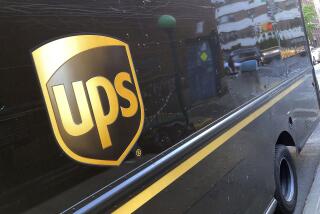Philip Morris Is Planning to Restructure Food Units : Overhaul: The changes, which may include quitting some businesses, will put a dent in earnings.
- Share via
NEW YORK — Philip Morris Cos. said Wednesday that it plans to restructure food operations to make them more efficient but will absorb a big earnings hit because of the revamping and because of new accounting rules on retiree benefits.
The company didn’t offer specifics about the restructuring but said it could include consolidations and leaving some lines of business.
The food and tobacco giant also authorized spending up to $2 billion over the next two years on repurchasing common stock. It spent $751 million the past two years under a $1.5-billion buyback authorization.
Excluding the two charges that total nearly $1.3 billion, Chairman Michael Miles said growth in earnings per share would exceed 20% in 1991.
But the news failed to impress investors. On the New York Stock Exchange, Philip Morris closed down $1.625 at $68.125.
Food companies are under pressure to maintain profit margins through cost cutting because of the recession and consumer resistance to price increases.
The planned food operations restructuring at Philip Morris would be the first major move since Miles, the former Kraft General Foods boss, succeeded Hamish Maxwell as chairman and chief executive of the company Sept. 1.
Philip Morris has become a world leader in the foods business through acquisitions the past six years. Its brands include Miracle Whip, Velveeta, Post, Maxwell House, Jell-O, Oscar Mayer and Birds Eye.
Food operations now account for about half the company’s sales.
The company said the food business restructuring would reduce earnings after taxes by $275 million in the fourth quarter. It earned $880 million, or 95 cents a share, on revenue of $14.2 billion in the fourth quarter of 1990.
Philip Morris did not specify what changes are planned but said the restructuring would improve efficiency and result in $750 million in cost savings the next five years.
Food operations accounted for about a third of the company’s $7.5-billion operating profit in the first nine months of the year and nearly half its $42.8 billion in sales. It earned $3.5 billion, or $3.83 a share, on revenue of $51.2 billion in all of 1990.
Analysts said they had not been told any specifics about the restructuring but guessed it would be mainly in U.S. operations and include job eliminations.
Philip Morris employed 168,000 people at the end of 1990. It declined to say how many were in the foods business.
Emanuel Goldman, an analyst at Paine Webber Inc., said a company as large as Philip Morris must continually consolidate, especially in a recession.
“It’s an extraordinarily competitive marketplace right now, and if you can’t raise your prices, you have to lower your costs,” said John McMillin, who follows the company for Prudential Securities.
McMillin said he suspects that the restructuring will affect the company’s food service distribution business, which handles deliveries to hotels and restaurants. “It has been struggling,” he said.
Besides the foods restructuring, Philip Morris said it will absorb an accounting charge of $1 billion against earnings in 1991 due to a new accounting standard for treatment of non-pension benefits to retirees.
Companies have been given until January, 1993, to adopt the new standard, which changes how companies account for spending on things such as retiree health care. Several already have.
Philip Morris said the charge would have no impact on anticipated cash flow. It added that the two major credit ratings agencies, Moody’s Investors Service and Standard & Poor’s, said the charge won’t affect ratings of its debt.
More to Read
Inside the business of entertainment
The Wide Shot brings you news, analysis and insights on everything from streaming wars to production — and what it all means for the future.
You may occasionally receive promotional content from the Los Angeles Times.










